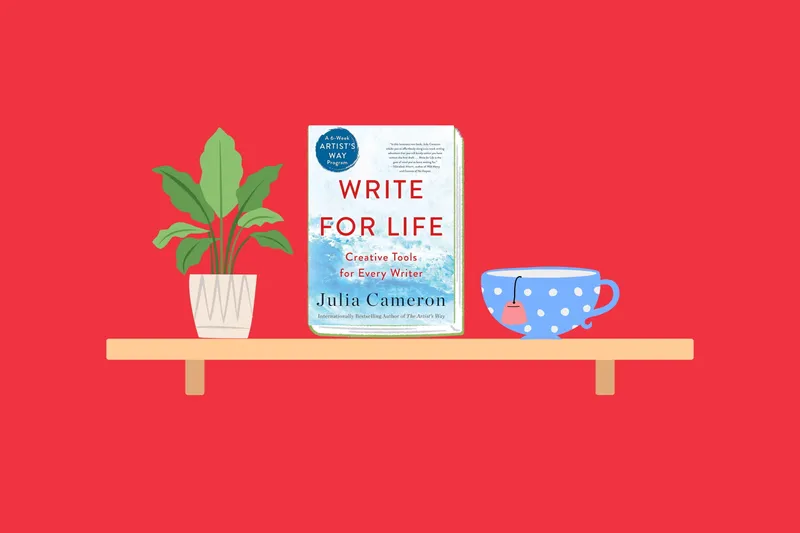During the pandemic, I read Julia Cameron’s The Artist’s Way, the classic twelve-week course that guides artists of any kind through the process of recovering creativity. Although the book is intended to help artists overcome artistic blocks, I picked it up because I love reading books that attempt to demystify the creative process — similar to the way other people might binge “Bridgerton”.
After reading The Artist’s Way, I went on to also read Cameron’s The Right to Write. The book is an invitation for the reader to write, because writing brings clarity and passion to the act of living. Hear, hear! Writing, Cameron argues, is grounding and good for the soul. I can’t argue with that.
Cameron’s latest book, Write for Life: Creative Tools for Every Writer, is a 6-week program that provides writers with tricks and tools to complete their writing project, from ways to beat procrastination to advice on revision.
There are two core concepts at the heart of Julia Cameron’s approach that you’ll find in all of her books: Morning Pages and Artist Dates. Write for Life introduces a third: the Daily Quota.
Morning Pages
Morning Pages are three pages of strictly stream-of-consciousness longhand writing on eight and a half by eleven-inch paper, done upon awakening. Yup, that’s right, and she’s ambivalent about whether or not this practice can be combined with caffeine. Do what you need to do — you’ll find no judgement here. The intention is to purge any negativity onto the page, become aware of insights and goals, and be sparked into action. A journal becomes an affordable room of one’s own that provides autonomy and coaxes the practitioner into greater creativity. Sounds pretty good, doesn’t it?
I used to love keeping journals, but what I did at the time was practice composing stories. The only real purpose was storytelling, even if it was just meant for me, and each entry was carefully composed. With the pandemic raging outside the doors, the idea of venting negativity onto the page as described in The Artist’s Way was appealing. But I stopped journaling fifteen years ago or more, because I thought that if I simultaneously wrote a journal while writing fiction, I would use up my words. What compelled me to try Cameron’s Morning Pages was her assurance that increased productivity is a common fruit of the practice. The pages train us to write quickly.
Increased productivity is a common fruit.
Artist Dates
The second touchstone to Julia Cameron’s philosophy on creativity are weekly Artist Dates. These dates are essentially creative upkeep: two hours during which you take your inner writer on a solo adventure to feed the creative well. It’s a mission of just doing something fun.
We play and experience the play of ideas.
The Daily Quota
In Write for Life, Cameron suggests writing a set number of pages on your project, every day. For prose, she recommends two pages. She advises writers to set the bar low, because slow and steady progress limits the risk of draining your inner well of inspiration. If your writing does become more difficult and thin, her remedy is a second weekly artist date.
On First Thoughts
Cameron’s essay on “First Thoughts” resonated with me. Too often, Cameron says, we sit down to write and reject our initial idea, trying to find a better way to say it, when the first idea is often the best. Our first thought leads to a second; our second thought leads to the third. Pause at the first and you stop the process, preventing the play of ideas from unfolding. I enjoy editing and often have to remind myself that the first draft is not the time for revision. My goal is to take Cameron’s advice to heart and trust my first thoughts — at least, when penning a first draft.
When your writing is freed of the need to be perfect, it is often astonishing how close to perfect it becomes.
Further Reading
As I read Write for Life, I was reminded of other texts I’d read on writing and creativity. Stephen King in On Writing also advocates a daily quota (1,000 words a day and one day off a week) and reading to feed the well. Creative Visualization for Writers by Nina Amir is a workbook that offers tools to nourish positive thinking and overcome the inner critic, thereby increasing productivity. Writing Down your Soul by Janet Conner takes the concept of Julia Cameron’s Morning Pages, but provides lists of questions that can be used as journaling prompts to direct and hone the insights gained by writing down your soul. Austin Kleon, the author of Steal Like an Artist: 10 Things Nobody Told You About Being Creative, describes on his website how he writes three pages in his diary every morning but adds a variation of mind-mapping, in which he clusters ideas in a form of non-linear map-writing.

Write for Life is an encouraging companion for writers completing a first draft and would be especially useful for those tackling NaNoWriMo.
I received a free copy from NetGalley in exchange for my honest review, but full disclosure: I enjoyed Write for Life so much that I’ve pre-ordered a copy to add to my collection.

About Vanessa Westermann
Vanessa writes feel-good romantic mysteries. She is the author of Cover Art and other books.

